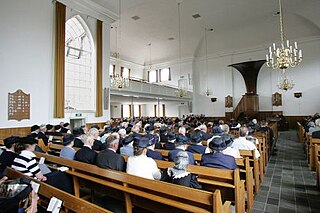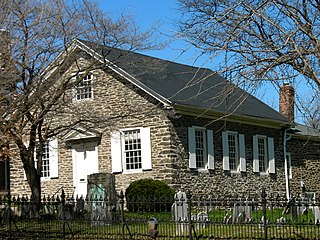Related Research Articles

Evangelicalism, also called evangelical Christianity or evangelical Protestantism, is a worldwide interdenominational movement within Protestant Christianity that affirms the centrality of being "born again", in which an individual experiences personal conversion; the authority of the Bible as God's revelation to humanity ; and spreading the Christian message. The word evangelical comes from the Greek (euangelion) word for "good news".
Fundamentalism is a tendency among certain groups and individuals that is characterized by the application of a strict literal interpretation to scriptures, dogmas, or ideologies, along with a strong belief in the importance of distinguishing one's ingroup and outgroup, which leads to an emphasis on some conception of "purity", and a desire to return to a previous ideal from which advocates believe members have strayed. The term is usually used in the context of religion to indicate an unwavering attachment to a set of irreducible beliefs.

Christian fundamentalism, also known as fundamental Christianity or fundamentalist Christianity, is a religious movement emphasizing biblical literalism. In its modern form, it began in the late 19th and early 20th centuries among British and American Protestants as a reaction to theological liberalism and cultural modernism. Fundamentalists argued that 19th-century modernist theologians had misinterpreted or rejected certain doctrines, especially biblical inerrancy, which they considered the fundamentals of the Christian faith.

The Holiness movement is a Christian movement that emerged chiefly within 19th-century Methodism, and to a lesser extent other traditions such as Quakerism, Anabaptism, and Restorationism. The movement is historically distinguished by its emphasis on the doctrine of a second work of grace, generally called entire sanctification or Christian perfection and by the belief that the Christian life should be free of sin. For the Holiness Movement "the term 'perfection' signifies completeness of Christian character; its freedom from all sin, and possession of all the graces of the Spirit, complete in kind." A number of evangelical Christian denominations, parachurch organizations, and movements emphasize those beliefs as central doctrine.

Independent Baptist churches are Christian congregations, generally holding to conservative Baptist beliefs. Although some Independent Baptist churches refuse affiliation with Baptist denominations, various Independent Baptist Church denominations have been founded.

Charis Fellowship, known before 2018 as the Fellowship of Grace Brethren Churches, and before 1976 under the name of National Fellowship of Brethren Churches, is a theologically conservative fellowship of Brethren churches that was founded in 1939 as a conservative split from the Brethren Church. The word charis is Greek in origin, meaning “grace.” The church traces its roots back to the Schwarzenau Brethren movement of Alexander Mack, founded in 1708 in Schwarzenau, Germany.

John R. Rice was a Baptist evangelist and pastor and the founding editor of The Sword of the Lord, an influential fundamentalist newspaper.

Carl Ferdinand Howard Henry was an American evangelical Christian theologian who provided intellectual and institutional leadership to the neo-evangelical movement in the mid-to-late 20th century. His early book, The Uneasy Conscience of Modern Fundamentalism (1947), was influential in calling evangelicals to differentiate themselves from separatist fundamentalism and claim a role in influencing the wider American culture. He was involved in the creation of numerous major evangelical organizations, including the National Association of Evangelicals, Fuller Theological Seminary, Evangelical Theological Society, Christianity Today magazine, and the Institute for Advanced Christian Studies. The Carl F. H. Henry Institute for Evangelical Engagement at Southern Baptist Theological Seminary and the Carl F. H. Henry Center for Theological Understanding at Trinity International University seek to carry on his legacy.
Signs and wonders refers to experiences that are perceived to be miraculous as being normative in the modern Christian experience, and is a phrase associated with groups that are a part of modern charismatic movements and Pentecostalism. This phrase is seen multiple times throughout the Bible to describe the activities of the early church, and is historically recorded as continuing, at least in practice, since the time of Christ. The phrase is primarily derived from Old and New Testament references and is now used in the Christian and mainstream press and in scholarly religious discourse to communicate a strong emphasis on recognizing perceived manifestations of the Holy Spirit in the contemporary lives of Christian believers. It also communicates a focus on the expectation that divine action would be experienced in the individual and corporate life of the modern Christian church, and a further insistence that followers actively seek the "gifts of the Spirit".
Rolland D. McCune was an American theologian and ordained Baptist minister. He was professor of Systematic Theology at the Detroit Baptist Theological Seminary in Allen Park, Michigan, where he had been the President of the Seminary for ten years and then Dean of the Faculty for six years. He was active at the Detroit Baptist Theological Seminary from 1981 to 2009.
William Bell Riley was an American Baptist evangelical Christian pastor.

Reformed fundamentalism arose in some conservative Presbyterian, Congregationalist, Reformed Anglican, Reformed Baptist, and other Reformed churches, which agreed with the motives and aims of broader evangelical Protestant fundamentalism. The movement was historically defined by a repudiation of liberal and modernist theology, the publication (1905-1915) entitled, The Fundamentals, and had the intent to progress and revitalise evangelical Protestantism in predominantly English-speaking Protestant countries. The Fundamentalist–Modernist controversy, and the Downgrade controversy, kindled the growth and development of reformed fundamentalism in the United States and the United Kingdom. Reformed fundamentalists have laid greater emphasis on historic confessions of faith, such as the Westminster Confession of Faith. Sixteenth century Reformers such as John Calvin, Martin Luther, John Knox, Theodore Beza, Philip Melanchthon and Protestant ministers such as Matthew Henry, John Gill, John Bunyan, George Whitefield, Jonathan Edwards, Charles Spurgeon, J. C. Ryle, John Burgon, F. B. Meyer, Dwight L. Moody, George Müller and G. Campbell Morgan have shaped the leaders in this reformed tradition. The Princeton theology and Neo-Calvinism are two biblical schools of orthodox reformed theology that influenced the movement's theological positions and outlook.
Harold John Ockenga was a leading figure of mid-20th-century American Evangelicalism, part of the reform movement known as "Neo-Evangelicalism". A Congregational minister, Ockenga served for many years as pastor of Park Street Church in Boston, Massachusetts. He was also a prolific author on biblical, theological, and devotional topics. Ockenga helped to found the Fuller Theological Seminary and Gordon-Conwell Theological Seminary, as well as the National Association of Evangelicals (NAE).
A Bible college, sometimes referred to as a Bible institute or theological institute, is an evangelical Christian or Restoration Movement Christian institution of higher education which prepares students for Christian ministry with theological education, Biblical studies and practical ministry training.

Louis Sylvester Bauman was a Brethren minister, writer, and Bible conference speaker, holding influential leadership in the Brethren Church and the "Grace Brethren" movement which evenly divided the denomination in 1939. He served in several pastorates, in particular the First Brethren Church of Long Beach, California where he was pastor for thirty-four years (1913–1947).

In the United States, evangelicalism is a movement among Protestant Christians who believe in the necessity of being born again, emphasize the importance of evangelism, and affirm traditional Protestant teachings on the authority as well as the historicity of the Bible. Comprising nearly a quarter of the US population, evangelicals are a diverse group drawn from a variety of denominational backgrounds, including Baptist, Mennonite, Methodist, Pentecostal, Plymouth Brethren, Quaker, Reformed and nondenominational churches.

The Winona Lake Historic District is located along the Eastern shore of Winona Lake in Kosciusko County, Indiana. Historically, it is perhaps best known as a major center within the evangelical Bible Conference Movement during the first half of the twentieth century, though these gatherings were just one part of the larger history of the town of Winona Lake, an area which has been a Chautauqua site, resort spot, and conference center. It has been listed on the National Register of Historic Places in Kosciusko County, Indiana, since 1993.

The Evangelical Methodist Church of America Christian denomination based in the United States. Ardently Fundamental, the denomination has its roots in a movement of churches that broke away from Mainline Methodism in the 1940s and 50s.
Moderate Christianity is a theological movement in Christianity that seeks to make decisions based on spiritual wisdom.
References
- ↑ George M. Marsden, Fundamentalism and American Culture, New York: Oxford University Press, 1980.
- ↑ Mark Sidwell. "'Come Apart and Rest A While': the Origin of the Bible Conference Movement in America". Detroit Baptist Seminary Journal 15 (2010): 75–98.
- ↑ Joel A. Carpenter, Revive Us Again: The Reawakening of American Fundamentalism, New York: Oxford University Press, 1997.
- ↑ Mark Sidwell. "'Come Apart and Rest A While': the Origin of the Bible Conference Movement in America". Detroit Baptist Seminary Journal 15 (2010): 75–98.
- ↑ Mark Sidwell. "'Come Apart and Rest A While': the Origin of the Bible Conference Movement in America". Detroit Baptist Seminary Journal 15 (2010): 75–98.
- ↑ Mark Sidwell, "The History of the Winona Lake Bible Conference," PhD dissertation, Bob Jones University, 1988.